great grandpa
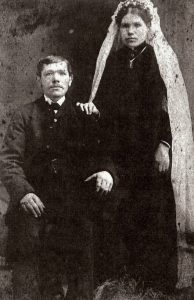 My great grandparents, Henriette and Carl Schumacher were both of German descent. They both came to America at different times…Grandma in 1882 and Grandpa in 1884. They met at a baptism and fell in love. They were married, and had 7 children, one of whom died as a little girl. They were just two of the many German people who have come to this country as far back as the colonial days. Of course, there were many German people who came here before my great grandparents. One of the most notable groups was the 13 German Mennonite families from Krefeld who landed in Philadelphia. These families founded Germantown, Pennsylvania on October 6, 1683. The settlement was the first German establishment in the original thirteen American colonies.
My great grandparents, Henriette and Carl Schumacher were both of German descent. They both came to America at different times…Grandma in 1882 and Grandpa in 1884. They met at a baptism and fell in love. They were married, and had 7 children, one of whom died as a little girl. They were just two of the many German people who have come to this country as far back as the colonial days. Of course, there were many German people who came here before my great grandparents. One of the most notable groups was the 13 German Mennonite families from Krefeld who landed in Philadelphia. These families founded Germantown, Pennsylvania on October 6, 1683. The settlement was the first German establishment in the original thirteen American colonies.
There are many people in the United States who can trace their ancestry back to German roots in one way or another, and the German-American people have been a building block in this nation. These were people who wanted to come here for a better 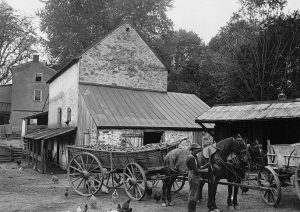 life, or to escape some of the horrors of the German government, and I for one am thankful that my grandparents immigrated to this country. President Ronald Reagan believed that the German-American heritage was so important to this nation, that in 1983, he proclaimed October 6 as German-American Day to celebrate and honor the 300th anniversary of German American immigration and culture to the United States. On August 6, 1987, Congress approved S.J. Resolution 108, designating October 6, 1987, as German-American Day. It became Public Law 100-104 when President Reagan signed it on August 18, 1987. Proclamation number 5719 was issued on October 2, 1987, by President Reagan in a formal ceremony in the White House Rose Garden, at which time the President called on Americans to observe the Day with appropriate ceremonies and activities. Now for many people, that might include German beer, as well as Oktoberfest activities…basically a party.
life, or to escape some of the horrors of the German government, and I for one am thankful that my grandparents immigrated to this country. President Ronald Reagan believed that the German-American heritage was so important to this nation, that in 1983, he proclaimed October 6 as German-American Day to celebrate and honor the 300th anniversary of German American immigration and culture to the United States. On August 6, 1987, Congress approved S.J. Resolution 108, designating October 6, 1987, as German-American Day. It became Public Law 100-104 when President Reagan signed it on August 18, 1987. Proclamation number 5719 was issued on October 2, 1987, by President Reagan in a formal ceremony in the White House Rose Garden, at which time the President called on Americans to observe the Day with appropriate ceremonies and activities. Now for many people, that might include German beer, as well as Oktoberfest activities…basically a party.
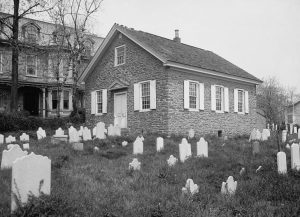 The Germantown, Pennsylvania, settlers organized the first petition in the English colonies to abolish slavery in 1688. Originally known as German Day, the holiday was celebrated for the first time in Philadelphia in 1883, on the occasion of the 200th anniversary of the arrival of the settlers from Krefeld. Similar celebrations developed later in other parts of the country, but the custom died out during World War I as a result of the anti-German sentiment that prevailed at the time. Then, in 1983, President Reagan decided that the time had come to reinstate it. I think it’s a good thing, because those German people who left Germany, were not like the German government was. They were truly good people, who were good for this nation.
The Germantown, Pennsylvania, settlers organized the first petition in the English colonies to abolish slavery in 1688. Originally known as German Day, the holiday was celebrated for the first time in Philadelphia in 1883, on the occasion of the 200th anniversary of the arrival of the settlers from Krefeld. Similar celebrations developed later in other parts of the country, but the custom died out during World War I as a result of the anti-German sentiment that prevailed at the time. Then, in 1983, President Reagan decided that the time had come to reinstate it. I think it’s a good thing, because those German people who left Germany, were not like the German government was. They were truly good people, who were good for this nation.
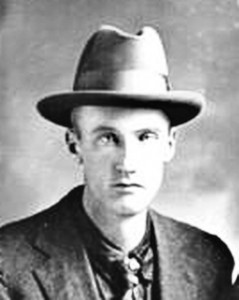 My husband, Bob’s great grandfather, Chester Leary worked for the railroad for most of his adult life. As a railroad worker, I’m sure he saw his share of close calls and accidents over the many years he worked there. Many railroad accidents make the national news, of course, but it’s possible they didn’t so often many years ago, because communication wasn’t quite as good. Nevertheless, if you lived near the train wreck, I’m sure you heard about it. I’m also sure that railroad yard accidents were a somewhat common occurrence. There is so much that goes on in a railroad yard, that sometimes things get missed, and an accident happens, but in my research for this story, I couldn’t find the accident in question here, or in fact, much information about very many railroad yard accidents at all. Maybe they just weren’t a news worthy event, unless someone was killed in the accident.
My husband, Bob’s great grandfather, Chester Leary worked for the railroad for most of his adult life. As a railroad worker, I’m sure he saw his share of close calls and accidents over the many years he worked there. Many railroad accidents make the national news, of course, but it’s possible they didn’t so often many years ago, because communication wasn’t quite as good. Nevertheless, if you lived near the train wreck, I’m sure you heard about it. I’m also sure that railroad yard accidents were a somewhat common occurrence. There is so much that goes on in a railroad yard, that sometimes things get missed, and an accident happens, but in my research for this story, I couldn’t find the accident in question here, or in fact, much information about very many railroad yard accidents at all. Maybe they just weren’t a news worthy event, unless someone was killed in the accident.
In fact, I wouldn’t have known about this train wreck at all, except that Bob’s cousin, Joe Brown sent me the picture of the wreck, with Chester Leary in the picture. The picture had the date of the accident listed on the picture, so I know that the date is correct…May 2, 1919. Nevertheless, when I looked for information on that train wreck in Forsyth, Montana in the railroad yard, I found absolutely nothing. To me that is such an odd thing. My curious mind wants to know more about how this accident happened. Was someone not paying attention to the trains coming in and out of the yard? Was anyone hurt? When did electronic tracking of the trains come into being, and would that have made a difference, since it all happened in the yard?
![Train Wreck at Forsyth, MT]pm yard May 2, 1919 Chester Leary](https://carynschulenberg.com/wp-content/uploads/2016/01/Train-Wreck-at-Forsyth-MT-yard-May-2-1919-Chester-Leary-300x198.jpg) Unfortunately, Bob’s great grandfather is no longer with us, and in fact he passed away in 1950, before either of us were born, so we couldn’t have possibly asked such a question, and wouldn’t have know to had we been born earlier. I’m sure his grandmother, Vina Hein knew what happened, because she was probably told all about it by her dad, Chester Leary. I don’t know if her dad was involved, or not, but I’m sure that would have been a story told around the dinner table that night. I really wish I could have had the opportunity to ask Bob’s great grandfather or my grandfather about all of their railroad experiences, because I have to think that it would have been very interesting to hear about it all. Especially about when things went very wrong.
Unfortunately, Bob’s great grandfather is no longer with us, and in fact he passed away in 1950, before either of us were born, so we couldn’t have possibly asked such a question, and wouldn’t have know to had we been born earlier. I’m sure his grandmother, Vina Hein knew what happened, because she was probably told all about it by her dad, Chester Leary. I don’t know if her dad was involved, or not, but I’m sure that would have been a story told around the dinner table that night. I really wish I could have had the opportunity to ask Bob’s great grandfather or my grandfather about all of their railroad experiences, because I have to think that it would have been very interesting to hear about it all. Especially about when things went very wrong.
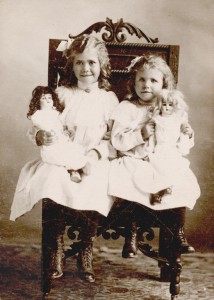 It would be hard for most of us to imagine a world where we got to go to town only once a year, and yet that was the way of things back when my Great Aunt Bertie Schumacher was a little girl. The Schumacher family moved from Minnesota to a place 8 miles from Lisbon, North Dakota, and the school house was 3 miles from where they lived. Bob and I, in our many evening walks have walked 8 miles at a time, but not in the winter, and since that walk takes us 2 hours, I can’t say that it would be feasible as a way to go to town for groceries, because then there is that walk back loaded down with groceries. Just the thought of 4 hours of walking in the winter cold is enough to make me cringe.
It would be hard for most of us to imagine a world where we got to go to town only once a year, and yet that was the way of things back when my Great Aunt Bertie Schumacher was a little girl. The Schumacher family moved from Minnesota to a place 8 miles from Lisbon, North Dakota, and the school house was 3 miles from where they lived. Bob and I, in our many evening walks have walked 8 miles at a time, but not in the winter, and since that walk takes us 2 hours, I can’t say that it would be feasible as a way to go to town for groceries, because then there is that walk back loaded down with groceries. Just the thought of 4 hours of walking in the winter cold is enough to make me cringe.
Nevertheless, the children needed to be in school, so Great Grandpa Carl Schumacher got up early every morning, to get the horses out and break a trail, then hook up to the sleigh for the 3 mile drive in to the school with his older children, Anna (my grandmother), Albert, and Mina. Aunt Bertie remarks in her journal, that she and Elsa were very glad that they could stay home with their mother. The sleigh was nothing like the more romantic New England cutters we all think about, but was rather a grain wagon box placed on two heavy runners pulled by their sturdiest horses because of all the deep snow the area got. Great Grandma Henriette would bring the older 3 children out to the wagon, and place bricks she had heated by their feet. Then she would wrap them in blankets that even covered their faces to protect them from the bitter cold. In all the time the children went to that school, they were there everyday, unless they were sick. It was by far the best attendance record in the school, and the Schumacher family lived the furthest away from the school. When Aunt Bertie went to school, a place she was not very fond of, she had to force herself to do what she needed to. It was at this time that she met the only teacher that would remain in her memory for the rest of her life. She was beautiful, and well dressed, but it was her graciousness and her love for children that made her the best teacher little Bertie would ever have.
Not long after Bertie started school, the family moved closer to Lisbon, and the school was only a mile away, and much to Bertie’s delight, it had an indoor bathroom. No more running outside to the outhouse in the middle of a freezing cold day and then running back inside in 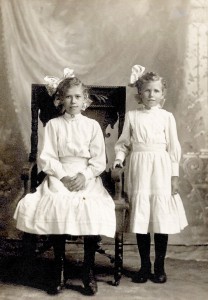 the cold again. Bertie felt like she was attending school in a palace, I’m sure. One day, when her mother had to drive the long distance into town on a very cold winter day, she decided to leave little 4 year old Elsa at the school with Bertie and their brother, Fred for the day. Elsa had never been away from her mother before, and they were very close, so she proceeded to cry. The older children could not console her, and finally a teacher came and took Elsa under her wing, calming her and allowing her and her siblings the peace of knowing that everything was going to be alright. Bertie recalls how it is funny that the memories that really stay in your memory are the ones where someone showed such love and kindness that the memory of it lingered on for years to come. What a lovely way to be remembered. That is something I think I should like to be remembered as. Loving and kind enough that the memory of my acts of kindness and love stay in the memories of those whose lives I might have touched.
the cold again. Bertie felt like she was attending school in a palace, I’m sure. One day, when her mother had to drive the long distance into town on a very cold winter day, she decided to leave little 4 year old Elsa at the school with Bertie and their brother, Fred for the day. Elsa had never been away from her mother before, and they were very close, so she proceeded to cry. The older children could not console her, and finally a teacher came and took Elsa under her wing, calming her and allowing her and her siblings the peace of knowing that everything was going to be alright. Bertie recalls how it is funny that the memories that really stay in your memory are the ones where someone showed such love and kindness that the memory of it lingered on for years to come. What a lovely way to be remembered. That is something I think I should like to be remembered as. Loving and kind enough that the memory of my acts of kindness and love stay in the memories of those whose lives I might have touched.
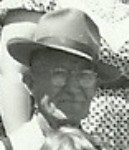 Bob’s great grandfather, Edgar Knox was an unusual person. He was the type of person who just never quit, never gave up on life. I only met him on that one visit, but that in itself was an amazing thing. He and great grandma traveled from Yakima, Washington to Casper, Wyoming for a visit in July of 1976, when my youngest daughter, Amy was just a month old, and my oldest daughter was 1 year old. They came down with Bob’s great aunt and uncle, Helen and Frank, but I still call the trip amazing in that Great Grandpa Knox was 93 years old at the time it took place, and yet he didn’t seem like he was a day over 70.
Bob’s great grandfather, Edgar Knox was an unusual person. He was the type of person who just never quit, never gave up on life. I only met him on that one visit, but that in itself was an amazing thing. He and great grandma traveled from Yakima, Washington to Casper, Wyoming for a visit in July of 1976, when my youngest daughter, Amy was just a month old, and my oldest daughter was 1 year old. They came down with Bob’s great aunt and uncle, Helen and Frank, but I still call the trip amazing in that Great Grandpa Knox was 93 years old at the time it took place, and yet he didn’t seem like he was a day over 70.
He and Great Grandma Knox still lived in their own home, just the two of them, with no help. They were both fully able to handle life on their own. Their home was beautiful, and well kept. He tinkered around the house keeping things maintained, while Great Grandma kept the inside of the house in perfect order and gave it that warm and welcoming feeling.
We enjoyed the time spent with them so much, that we made plans to travel to Yakima to visit them again. It just wasn’t often that you had the chance to spend time with someone his age that was so full of life, and we wanted that chance again. Unfortunately, that was not to be. When Great Grandpa got back to Yakima, he once again started doing some things around the house to prepare it for the winter months, and while cleaning out the gutters, up on a ladder, he fell and broke his hip. He was taken to the 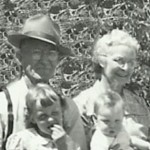 hospital, and seemed to be doing ok, but went into shock and was quickly gone.
hospital, and seemed to be doing ok, but went into shock and was quickly gone.
We grieved the loss of this wonderful man, but made the decision to go on the trip anyway. It was a good decision. We had a wonderful visit with Great Grandma Knox, even though it was overshadowed with some grief, but we all agreed that Great Grandpa had lived a very full life. Going home at the grand old age of 93 years, isn’t the worst thing that can happen, when that life was one filled with activity, strength, and one’s full faculties right up to the end. While we missed him on that visit, we were always glad we came, because I think it was what he would have wanted.

